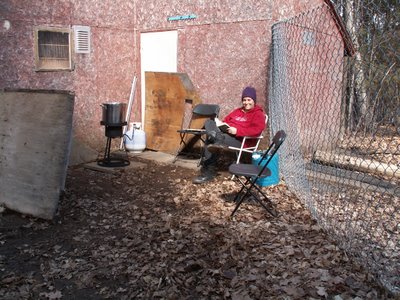Take out your description and let's go through it.
1-
Nationality: If you are a Canadian living in Canada, did you think of mentioning your nationality? I think perhaps if you live in Quebec, you might have put something down regarding your nationality, seeing as you don't want to pass for an Anglo. Perhaps, born and raised in Quebec, Canada, or something. Or Montrealer, if you are so inclined. Somethhing to affirm your distinct status. Of course, most of you are not from Canada, and so, as a minority will be touchy on the subject, wondering if you should mention anything at all and being in turmoil about it. That is because our identity is so linked to other people's reaction. I read that Jewish people starting reclaiming they were Jewish when persecutions started. In the movie "Shall we dance?", there is a sentence to the effect that we marry so we have a witness to our life, so that our life does not go unnoticed. It all ties in.
2-
Sexual identity: If you are heterosexual, why mention it? It is obvious, normal, and you don't even think of it, right? Yet is it a core characteristic of your being. Again, unless you are in a minority, gay, bi, transgender, you won't give it much thought when defining yourself. We define ourselves against inner or outer conflicts.
In psychology of old, a "normal" person was deemed to have all the qualities people associated to males. By definition, females were a bit askew...
3-
Race: Being Caucasian in Canada goes without saying, right? Again, these assumptions are what biases are made of. The first IQ tests were nothing more than cultural tests. They did not measure intelligence but social conformity. If you were a white middle-class kid in the US, you were pretty bright. If not, you were out of luck.
(BYW, these are examples I am making up just to challenge your assumptions. There are many other categories. I just selected those that came to mind.)
4-
Religion: This is another interesting one. You might have decided to write something relative to that topic. The province of Quebec was overwhelmingly Catholic until the 60s so depending on your age, you might have decided to take a stand - "I am an atheist" too oppose Catholicism which used to be such a strong force. Your upbringing might have been strict, you might have been sent to a private school manned by brothers or sisters, priests or nuns. Not at all unusual if you were destined for higher education.
5-
Handicaps: Did you mention any? Or mention you were whole? I guess that is a bit stretching it but again I was thinking that people these days associate with their disease. "I am a cancer survivor" defines many people.
6-
Trivial? I am not a lefty. When I grew up, my best friend was a lefty and that was a real issue for her in a world where objects are designed for right-handed people. Did you think of mentioning you were right-handed?
In class, we created a mental map using our answers of who we were and identified the values that were important to us. We linked the different attributes and saw those that were emotionally charged by the number of arrows that went to them and came out from them. It was revealing and intriguing, a nice way to get to know ourselves.
If I can just remember the teacher's name, she wrote a book about her method... I will look for it and let you know...










